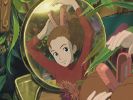Eye For Film >> Movies >> Arrietty (2010) Film Review
Studio Ghibli's latest confection is a magical adaptation of Mary Norton's oh-so-British kid-lit classic The Borrowers. For Hayao Miyazaki - the 'Japanese Walt Disney' - the film marks the realisation of a project he tried to get off the ground over 40 years ago, perhaps explaining its quaint nature and the absence of much of his later output's surreal quirkiness. It's also the directorial debut of animator Hiromasa Yonebayashi, the youngest person to have made a film for the company. While some fans of their more esoteric work - like Eighties faves Laputa and My Neighbour Totoro - will bemoan the relative simplicity of the narrative, patient viewers will find plenty to savour and all involved should be proud of their accomplishment.
Sho is a terminally ill teenager, on his way to stay with his kindly aunt Sadako. Their journey takes us from urban Tokyo out into the glorious green countryside, where the dense foliage holds a surprise for the observant youth; a miniature girl is slipping through the undergrowth. This is our heroine Arrietty, first glimpsed on the run from the family feline, narrowly escaping into her underground abode. There she lives with her mother Homily and father Pod, thinking they may well be the last of their kind, the 'Borrowers'. These tiny beings are so named for their practice of taking what they need from 'human beans', so long as it's not something that'll be missed.

The family's fearful dependency is established on one golden rule: they must never allow the humans to catch a glimpse of them. Arrietty's carelessness may result in her family having to leave their treasured home, but a curious Sho is determined to see more.
The first thing that will strike you about The Borrower Arrietty is how absolutely lush it is visually; the pastel landscape is utterly iridescent by day, and star-dusted luminous by night. The interior scenes are also gorgeously intricate, with reams of noteworthy mise-en-scene in every frame. Most of the screen may be filled with largely inanimate paintings, but every inch is awash with vibrant color and alive with joyful detail.
The relative restraint of the animation works in the film's favour; there's so much to take in that the action understandably takes a back-seat at times. Special mention must also be made of the score, its wistfully pastoral folk having been composed by unknown French musician and Gibhli devotee Cecile Corbel after she sent the studio a gushing fan letter. This speaks volumes about the personal touch that is evident all over; it's the sort of film you'll look forward to owning, just to soak up all of its old-fashioned finery.
Screenwriter Miyazaki is surprisingly respectful of Norton's original vision; the story references the books quite closely, subtly adapting several aspects for both the Eastern locale and the modern age. Part of the film's charm comes in its excellent evocation of scale; the use of perspective is outstanding, and the sporadic employment of twinkly lighting effects also adds to the atmosphere.
The way the little family uses our detritus - as well as the way they ingeniously negotiate our outsized domain - is wonderfully conveyed. Sugar cubes are their ultimate luxury; drops of water or soup are like boulders of liquid; stamps make for paintings and fairy lights become battery-powered lanterns. Arrietty's first Borrowing mission - under the shadowy cloak of night - is fabulously exciting, their exploration of our environment comparable to one of Indiana Jones' tomb raids. Scenes involving threat from gigantic animals are also brilliantly handled, being both funny and frantic, if perhaps a little less frequent than you'd expect and would maybe wish.
This is perhaps the film's greatest weakness; it is relatively uneventful and only modestly humorous, especially given the potential for both peril and hi-jinks. This is where it will lose favour with some of its audience, being neither snappy enough for children weaned on Pixar and Dreamworks nor subversively funny enough for adults used to the irony-laden likes of Shrek and Rango. The story is ultimately as slight as its eponymous heroine, despite some noble attempts to address such issues as economy and the environment. The former topic is represented in an appropriately low-key fashion that complements the story, but the latter is broached with a heavy-handed clumsiness that is perhaps to be expected - the threat of extinction and human destruction is a pivotal plot point in the book, and pretty much a given sideline in any modern kids' film in any case.
For all that though, there's a timeless quality to Arrietty's escapades, and a gentle poignancy that is all the more affecting by being so unforced for the most part. Come the ending (don't miss the animation accompanying the credits), you'll be sad to leave this world, but happy to see the characters venturing out to find new adventures. Arrietty is possibly the most accessible and consistent film by the studio yet, for both children and adults, especially in the West.
It'll probably bore the slightly older kids who would prefer the wackiness of its predecessor Ponyo, and it may fail to satisfy those enchanted by the wild fantasy of Spirited Away and Princess Mononoke, but it's a hell of a lot better than the last time Studio Ghibli tried to appeal to a more mainstream crowd (with the wishy-washy Tales From Earthsea), and it stands as a wonderful testament to traditional storytelling values and animation techniques.
Reviewed on: 18 Jun 2011


















